The drunk Deputy DA affair generated excellent documentation of perversion of court records and court process, hand in hand with unlawful hiding of court records from the public. Moreover, the affair generated an unprecedented recognition of such deceitful judicial practices by media. The entire deceit was perpetrated using Net-HaMishpat - case management system of the Court. The case also generated unique documentation of collusion by the Court and non-governmental, for profit legal databases in publishing fake court records.
Deputy DA Mounir Barhoum drove under the influence of alcohol. In the Jerusalem Traffic Court process was conducted (801-07-16), where Judge Naeel Mohana pretended to conduct a "hearing" ("informal, off the record"), where the Defendant pleaded guilty - but there is no protocol of the "hearing" in the electronic court file. Later, Judge Naeel Mohana pretended to conduct a "hearing", where the "sentencing" was read, but there is no sentencing record to be found in the electronic court file either.
Veteran legal correspondent Itamar Levine openly stated in his report - "in violation of all customary practices and fundamental rules of administration of a court file"...
In parallel, non-governmental, for-profit legal databases (e.g., "Takdin") published the fake "sentencing" record from an unknown source, which says, that Defendant Mounir Barhoum was "not convicted" - a common practice in perverting court process to benefit "celebs".
The story continued with an "appeal" filed by the State in the Jerusalem District Court, and purportedly conducted (39879-07-18) by District Judge Haya Zandberg. District Judge Zandberg purportedly convicted Deputy DA Mounir Barhoum, and criticized Judge Naeel Mohana for his conduct.
The obvious question is: How could a legal scholar, such as Judge Haya Zandberg, conduct an "appeal", originating in no judgment of the lower court?
The court process in the District Court was reported by media as well. However, in this case, no comment was made regarding "violation of all customary practices and fundamental rules of administration of a court file"... or violation of Criminal Court Procedure and judicial conduct with no authority...
To top it off, both the Traffic Court and the District Court files are unlawfully hidden from public access regardless of the fact that the court files are not lawfully sealed...
Reports by the UN committee on "Strengthening Judicial Integrity against Corruption" explicitly note that disappearance of court files, court decisions and judgments are cardinal signs of incompetent and/or corrupt courts. The case at hand also documents the tight relationship between perversion of court process and hiding court files, or making them disappear...
The case at hand is not unusual at all for Israeli judges. Such conduct has become commonplace since the implementation of Net-HaMishpat case management system and the transition to electronic court files. Such conduct is particularly common in cases of high public policy significance - various government corruption cases.
And yet, the Drunk Deputy DA affair is unique, relative to media recognition of the falsification of court records and court process. Until now, media refused to report such routine "fabrications". Israeli legal scholars and judges have treated such conduct in an unforgivable forgiving manner as "immaterial procedural issues"...
The 2018 Human Rights Alert-NGO submission to the UN Human Rights Council was entirely dedicated to fabrications (deceit) in the Israeli law and justice system. The submission was incorporated into the final UN High Commissioner of Human Rights report on Israel (2018) and summed as follows:
24. HRA-NGO highlighted the serious deterioration in integrity of law and justice agencies as a consequence of the implementation of e-government systems. It affirmed that the validity and integrity of any legal and judicial records of Israel should be deemed dubious at best.Requests to inspect court files have been filed in recent days in both the Traffic Court and the District Court, in an attempt to clarify the conduct of the courts in this notable affair.
Read more: https://human-rights-alert.blogspot.com/2019/01/2019-01-13-drunk-deputy-district.html


---
Tel-Aviv, January 06 - request to inspect has been filed today in the Jerusalem Magistrate Court (Traffic) in the case of drunk Deputy DA Mounir Barhoum (see below a copy of the request to inspect).
Chapter I - the drunk Deputy DA
The case was widely reported by media.

Figure. "An Arab judge acquitted an Arab Deputy DA, and then issued a gag order on the case" - report of the drunk Deputy DA affair in "The Jewish Voice".
---

Figure. "Common, listen to this crazy story..." - report of the drunk Deputy DA affair by "Adam Gold" - an infamous Twitter figure.
---
Chapter II - fake court process in the Jerusalem Traffic Court, Judge Naeel Mohana
Undoubtedly, the most professional and most accurate report was in News1 by veteran legal correspondent Itamar Levine. The report also included copies of all relevant court records.
Undoubtedly, the most professional and most accurate report was in News1 by veteran legal correspondent Itamar Levine. The report also included copies of all relevant court records.

Figure. "Deputy DA, who drove under the influence of alcohol was not convicted, so that he would not be dismissed, and his name was under a gag order" - - report of the drunk Deputy DA affair by Itamar Levine in News1.
---
Itamar levine writes: [1]
The case was assigned to Judge Naeel Mohana. The first hearing took place in May 2017, and Defendant Barhoum pleaded "Not guilty". The next hearing protocol is from March 2018, stating extension of time for the sentencing arguments hearing. The electronic court file in Net-HaMishpat shows no documentation of what transpired between the two hearings, and how the case changed from a pleading of "Not guilty" to scheduling a hearing for sentencing arguments. The May 13, 2018 Hearing Protocol, when sentencing arguments were heard, indicated that another hearing had taken place on November 12, 2017, where Defendant Barhoum had pleaded "Guilty" - but there is no protocol of that hearing in Net-HaMishpat....
The next hearing protocol is dated June 03, 2018, and it holds only one line: "The Court reads the Sentencing and delivers it to the parties." The Sentencing record itself is not found in the electronic court file either - in violation of all customary practices and fundamental rules of administration of a court file.
Two weeks later, Defense Counsel Schneor filed with Judge Mohana a request to place a gag order on the entire court file, or at least on Defendant Barhoum's name. Defense Counsel Schneor claimed that the publication would cause a serious harm to Barhoum's privacy. The request indicates that Judge Naeel Mohana avoided convicting Deputy DA Barhoum [regardless of Defendant pleading "Guilty" - jz] - in order not to risk Barhoum's losing his job in the DA's office. According to Defense Counsel Schneor - the Sentencing was published in legal databases...
Chapter III - publication of a fake "Sentencing" record in Takdin legal database
Indeed, the fake "Sentencing", which failed to be entered in the Court's electronic court file in Net-HaMishpat, was published in databases such as "Takdin".
The obvious question is: How did it get there?

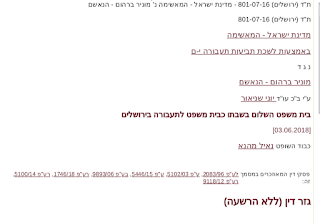
Figure. State of Israel v Mounir Barhoum (801-07-16) in the Jerusalem Magistrate (Traffic) Court - a fake "Sentencing" record, which has never been entered in the electronic court file in Net-HaMishpat, as published in "Takdin" legal database. The record is titled: "Sentencing (Without Conviction)"
---
Chapter IV - fake "Appeal" process in the Jerusalem District Court - Judge Haya Zandberg
Later, Counsel for the State filed an "Appeal" in the Jerusalem District Court, and District Judge Haya Zandberg pretended to conduct an appeal (39879-07-18), where she convicted Deputy DA Mounir Barhoum and criticized Magistrate Judge Naeel Mohana for his conduct.

Figure. "The Deputy DA, who drove under the influence of alcohol, was convicted in the District Court and dismissed" - report of the drunk Deputy DA affair in the Jerusalem District Court by Itamar Levine in News1.
---
The District Court process, presided by Judge Haya Zandberg was also covered by legal correspondent Itamar Levine, who wrote: [2]
Judge Haya Zandberg's Judgement, granted the State's appeal, and raised serious questions regarding Magistrate (Traffic) Court Judge Naeel Mohana's decision not to convict Mounir Barhoum.
...
As exposed by News1, Mohana granted Barhoum's request not to convict him, based on the claim that such conviction may lead to Barhoum's dismissal. Moreover, Judge Mohana prohibited - with Police consent - the publication of the entire court file. District Court Moshe Sobel permitted the publication. However, then it turned out that key records - the Conviction Protocol and the Sentencing record are missing from the electronic court file in Net-HaMishpat...
However, Mr Levine's report of District Court Judge Haya Zandberg's conduct is inconsistent with his report of Magistrate (Traffic) Judge Naeel Mohana's conduct:
- The report regarding District Judge Haya Zandberg says that "Judge Mohana granted Barhoum's request not to convict him"... In contrast, the report regarding the Magistrate (Traffic) Court states that there is neither record of Verdict, nor a record of Sentencing...
- The report regarding Judge Mohana's conduct says that it was " in violation of all customary practices and fundamental rules of administration of a court file." However, the report regarding District Judge Haya Zandberg skipped the obvious question: How could Judge Zandberg conduct an "Appeal", originating in neither a Verdict and nor a Sentencing of the lower court?
It should be noted that District Judge Haya Zandberg is a notable scholar, which is supposed to be uniquely qualified in both civil and criminal court process: [3]
- Completed her law degree at Hebrew University with distinction.
- Completed her internship with Supreme Court Deputy Presiding Justice Menahem Elon and later served as his legal assistant.
- Served in the State Prosecution as Director o the Civil Department.
- Completed her studies for a doctoral degree in law at Hebrew University.
- Taught Evidence Law and Criminal Procedure classes at Hebrew University law school.
- Published two books - Detentions (2001), and Defendants' Rights (2002) - and close to 20 academic papers.
Chapter V - denial of public access to court files
As noted in the report regarding the Magistrate (Traffic) Court process, Judge Moshe Sobel ruled that the Traffic Court file was not sealed. Likewise, Judge Haya Zandberg's "Judgment" explicitly states that the "Appeal" court file is not sealed.
And yet, today the two court files - both the Magistrate (Traffic) Court and the District Court files - are blocked to public access in Net-HaMishpat. Repeat attempts to access the two court files only generate the pop-up message - "The user is not permitted to view instant court file".
Figure. State of Israel v Nounir Barhoum (801-07-16) in the Jerusalem Magistrate (Traffic) Court, as well as State of Israel v Nounir Barhoum (39879-07-18) are today blocked to public access with no legal foundation.
---
Needless to say, the pop-up message in Net-HaMishpat provides no legal foundation for the denial of access. Such unlawful denial of public access to court files should be deemed offensive conduct.
However, it is not unusual at all...
Chapter VI - requests to inspect court files
Requests to inspect have been filed in both court files:
- In the Magistrate (Traffic) Court - Judge Naeel Mohana was asked to permit inspection of: (1) Any authentic court record, which provides the legal foundation for denial of public access to the court file; (2) Any authentic court hearing protocol, where Defendant pleaded "Guilty"; (3) Any authentic court record of the Sentencing; (4) Duly made case calendar.
- In the District Court file, Judge Haya Zandberg was asked to permit inspection of: (1) Any authentic court record, which provides the legal foundation for denial of public access to the court file; (2) The Notice of Appeal and its attachments.
Epilogue
Faking court process has become commonplace
The phenomena, which are documented in the Drunk Deputy DA affair are not unusual at all. Similar phenomena have been documented in numerous court files. Such phenomena are particularly common in court files of high public policy significance - such as various government corruption cases.
The
phenomena, which are documented in the Drunk Deputy DA affair are
remarkably similar to the phenomena, which were documented in the
Roman Zadorov affair. [4] Also
in Roman Zadorov’s case there is neither 2010 Verdict, nor 2010
Sentencing record in the electronic court file of the Nazareth
District Court in Net-HaMishpat – in
a murder trial! (Judges:
convicted sex offender Yitzhak Cohen, Esther Hellman, Haim Galpaz).
There too - fake court records were published in legal databases
(e.g., “Nevo”),
and there too - “Appeal” was conducted (in the Supreme Court!)
– originating in a “Notice of Appeal”, to which no authentic
judgment of the lower court was attached…
There
too – both the Nazareth District Court and the Supreme Court tried
to deny public access to the court files, in clear violation of the
law.
Once
the outcome of inspection of both
court
files in the Roman Zadorov case was widely published, and while the
appeal was still going on, Attorney Avigdor Feldman – then
Zadorov’s pro
bono Counsel
– wrote that he couldn’t find Zadroov’s true judgment records
from the Nazareth District Court, since they had been lost “in the
wailing wind across the Jezreel valley” [which the Nazareth Court
overlooks]. [5]
There are no longer competent Offices of the Clerks in the Israeli courts, and therefore, the courts are incompetent
Perversion
of court process and court record has become commonplace following
the implementation of Net-HaMishpat case management system. In the
aftermath, independent Office of the Clerk ceased to exist in the
Israeli courts, and the judges can do whatever they wish with court
files and court records.
One
of the fundamental principles in conduct of a competent court is the
establishment of checks and balances through the conduct of the two
arms of the court – the Judicial Arm and the Secretarial (or
Ministerial) Arm.
The
Israeli courts are the successors of the courts, which were
established by the British Mandate for Palestine on such principles.
Indeed, until 2004, the Office of the Clerk was charged with the
“excellent maintenance of court files and registries”
[Regulations of
the Courts – Office of the Clerk
(1936)]. The Israeli courts themselves then
ruled that a court, where there was
no competent Office of the Clerk, was
an incompetent court...

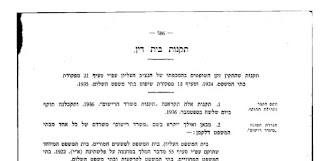
Figure. Regulations of the Courts - Office of the Clerk (1936) from the British Mandate for Palestine period.
---
Such checks and balances were abolished in 2004 under the tenure of Supreme Court Presiding Justice Aharon Barak and Justice Minister Tommy Lapid, in preparation for the transition to electronic court file administration... Such change in Regulations of the Courts begs for an explanation... Its effects are clearly seen today. Judges pervert court process, court records and court file entries at will.


Figures. Supreme Court Presiding Justice Aharon Barak and Justice Minister Tommy Lapid.
---
In this context it should be noted that a century ago, the US federal courts were afflicted with serious corruption. In the US Congress they were described as a "sham and burlesque..." Historians of the US courts note that reorganization of the Offices of the Clerks and strengthening their independence through the Salaries Act of 1919 was the most effective measure in combating court corruption at that time.
Collusion between the judges and legal databases relative to fake court records
The phenomena, which are documented here, pertaining to falsification of court record and the publication of fake court records in legal databases, were reported already in the Human Rights Alert-NGO submission to the UN Human Rights Council for the Universal Periodic Review of 2013. The submission was incorporated into the final 2013 report of the UN High Commissioner for Human Rights, and summed as follows:
Lack of integrity in electronic record systems of the Supreme Court, the district courts and the detainees courts in Israel.
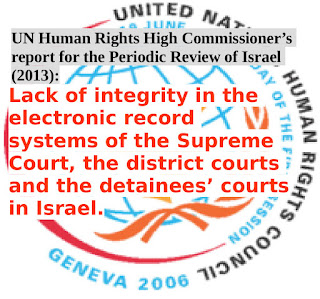
Such
phenomena were documented in further detail in the Human Rights Alert
-NGO [HRA-NGO] submission for the 2018 Universal Periodic Review.
The
submission was incorporated into the final UN High Commissioner of
Human Rights 2018 report on Israel, and summed as follows:
24. HRA-NGO highlighted the serious deterioration in integrity of law and justice agencies as a consequence of the implementation of e-government systems. It affirmed that the validity and integrity of any legal and judicial records of Israel should be deemed dubious at best.
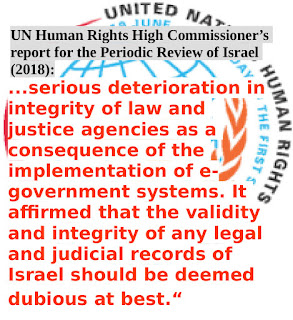
Falsification of court records and process, and denial of public access go hand in hand
The combination of falsification of court records and court process and denial of public access to court files is neither an ingenious invention, nor a novelty. Such phenomena have been known worldwide for centuries as typical conduct of incompetent and/or corrupt courts. Such phenomena are specifically noted in reports of the UN committee on "Strengthening Judicial Integrity against Corruption".
Exactly for such reasons, the Office of the Clerk has evolved, as a critical instrument for safeguarding the integrity of court files and court records. Likewise, exactly for such reasons, the right to inspect court records has evolved as a Civil Right of the highest significance (e.g., deemed part of the 1st Amendment to the US Constitution).
A 2009 Israeli Supreme Court Judgment pertaining to the right to inspect court records [Association for Civil Rights in Israel v Minister of Justice 5917/97] is packed with highfalutin declarations regarding the significance of the right to inspect for the appearance of justice, for public trust in the courts - "a fundamental principle in any democratic regime... constitutional, supra-statutory..."
A 2009 Israeli Supreme Court Judgment pertaining to the right to inspect court records [Association for Civil Rights in Israel v Minister of Justice 5917/97] is packed with highfalutin declarations regarding the significance of the right to inspect for the appearance of justice, for public trust in the courts - "a fundamental principle in any democratic regime... constitutional, supra-statutory..."

However, as is the case with other "constitutional" rights in Israel, when it comes to the right to access court records, the judges blatantly violate their own rulings and their own lofty declarations.
Therefore, Supreme Court Presiding Justice Ether Hayut is unsuccessful in her recent campaign to convince the public that the judiciary safeguards the people's rights. MK (Attorney) Bezalel Smotrich stated it clearly: "The best PR person in the world wouldn't be able to help you..."
LINKS
[1] Deputy DA, who drove under the influence of alcohol was not convicted, so that he would not be dismissed, and his name was under a gag order | News1
[2] The Deputy DA, who drove under the influence, was convicted in the District Court and dismissed | News1
[3] Judge Haya Zandberg - official bio
[4] The Zadorov affair: Cadavers, stench, and strong formaldehyde odor | Avigdor Feldman
Request to inspect court file - filed in the Jerusalem District Court

[Bilingual record]
Filed by fax on January 05, 2019 - to 02-6292521
Regulations of the Courts – Inspection of Court Files (2003); Form 2 (Regulation 4(c))
Request to Inspect Court File
1. Requester's Details
a) Full name: Joseph Zernik, PhD
b) ID No:
c) Address: PO Box 33407, Tel-Aviv
d) Telephone: None
2. Court File Details
a) Court File Number:
39879-07-18 in the Jerusalem District Court
b) Parties:
State of Israel v Mounir Barhoum
c) Records, which are subject of the request:
(1) Any authentic court record, which is the legal foundation for blocking public access to instant court file in Net-HaMishpat;
(2) The Notice of Appeal, which commenced instant court file, and its attachments.
3. Purpose and Justification for the Inspection [summary only]
a) Media reported about instant court file in recent days, including News1: [1, above]
The Deputy DA, who drove under the influence, was convicted in the District Court and dismissed.
Judge Haya Zandberg’s Judgment, who granted the State’s appeal, raises serious questions regarding Traffic Judge Nail Mohana’s decision not to convict Mounir Barhoum.
Moreover, the above-referenced report includes a record, which appears as the December 04, 2018 Judgment in instant court file.
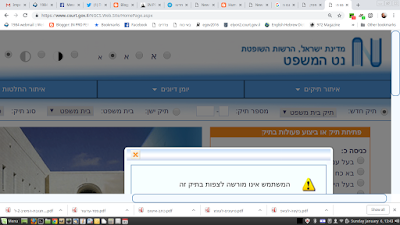
Figure 1. Attempt to inspect instant court file in Net-HaMishpat- public access system - on January 06, 2019.
---
b) Repeat attempts to inspect instant court file in Net-HaMishpat – public access system shows that the court file is blocked for public access. A pop-up message says: “The user is not permitted to view instant court file” (Figure 1). However, such message does not provide a lawful reference for sealing in instant court file. There is no doubt that implementing effective sealing with no lawful foundation is a serious violation of the right for public hearing, the right of the public to know, and a serious harm to public trust in the courts. Supreme Court 2009 Judgment, pertaining to the right to inspect court records [Association for Civil Rights in Israel v Minister of Justice 5917/97] includes numerous declarations in this matter, including a declaration that the right to inspect is “a fundamental principle in any democratic regime… constitutional, supra-statutory...”
c) The Judgment in instant court file opens by saying:
Appeal originating in the June 03, 2018 Judgment of the Traffic Court (Hon Judge Nail Mohana) Traffic Accident 801-07-16.
The matter in 801-07-16 court file was also extensively covered by media, including a professional, detailed report by Mr Itamar Levine, which says in part: [2, above]
The May 13, 2018 Protocol, pertaining to the Sentencing arguments hearing, indicates that on November 12, 2017, a hearing was held, in which Barhoum pleaded guilty – but that Protocol fails to appear in Net-HaMishpat…
The next Protocol is of the June 03, 2018 Hearing, and it runs one line only: “The Court reads and delivers that Sentence to the parties.” The Sentencing record itself fails to appear in the electronic court file – in contrast with standards and fundamental rules in the administration of a court record.
Therefore, the question is: What was the foundation for hearing instant Appeal in instant court file? The Court has no jurisdiction for hearing an appeal without a duly filed Notice of Appeal, including an authenticated copy of a duly made and entered judgment of the lower court.
d) The Requester’s core research pertains to e-government, government cyber operations, and their implications relative to Human Rights, Civil Society, and Democratic Institutions.
His work won appreciation in Israel and abroad:
Prof Uzzi Ornan - “All power to you! I hope that you see your tremendous efforts reach fruition!”
Attorney Avigdor Feldman - “In my opinion you are doing very important work… thank you for your thorough and persistent work”.
Prof Amnon Shashua, Mobileye Co-founder - “… very important work”.
International experts, as part of anonymous peer-review - “… challenges current thinking in the field”.
Four (4) submissions, authored by Dr Zernik and submitted under Human Rights Alert - NGO, were incorporated into UN Human Rights Council Periodic Reports regarding the US (2010, 2015) and Israel (2013, 2018).
The 2018 High Commissioner’s report on Israel included the following note:
24. HRA-NGO highlighted the serious deterioration in integrity of law and justice agencies as a consequence of the implementation of e-government systems. It affirmed that the validity and integrity of any legal and judicial records of Israel should be deemed dubious at best.
His research has been presented and published in international academic conferences, including Data Mining (2010), Criminology (2012), E-government (2015, 2016, 2017, 2018), Cyber and Law (2019) and were also cited in a textbook on “Machine Learning”:
Data mining of government records - particularly records of the justice system (i.e., courts, prisons) - enables the discovery of systemic human rights violations in connection to generation and publication of invalid or fraudulent legal records by various government agencies.
f) The requests to inspect and judicial decisions in the matter of such requests generate important research data in themselves, relative to the nature of the decisions, their due entry, service, etc.
4. Requester’s relationship to instant court file (direct /indirect)
No relationship at all.
5. Service on parties and on the Requester
The Court is asked to serve instant Request on the parties, together with an order, instructing them to file their responses and serve them on the Requester. The Court is requested to duly serve its decisions on instant Request.
Date: January 06, 2019 _______________
Joseph Zernik, PhD - Requester of Inspection
Human Rights Alert – NGO (AR 80654598)

No comments:
Post a Comment